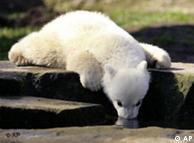Beijing's penis emporium
By Andrew Harding
BBC News, Beijing
There are many thousands of Chinese restaurants around in the UK and everyone has their favourite dish, but only in China itself do chefs specialise in a range of slightly more unusual delicacies.
A glass of deer penis juice amongst food on a table at the restaurant (Photo credit: Stefan Gates)
Many of the restaurant's guests are wealthy businessmen
The dish in front of me is grey and shiny.
"Russian dog," says my waitress Nancy.
"Big dog," I reply.
"Yes," she says. "Big dog's penis..."
We are in a cosy restaurant in a dark street in Beijing but my appetite seems to have gone for a stroll outside.
Nancy has brought out a whole selection of delicacies.
They are draped awkwardly across a huge platter, with a crocodile carved out of a carrot as the centrepiece.
Nestling beside the dog's penis are its clammy testicles, and beside that a giant salami-shaped object.
"Donkey," says Nancy. "Good for the skin..."
She guides me round the penis platter.
"Snake. Very potent. They have two penises each."
I did not know that.
Deer-blood cocktail
"Sheep... horse... ox... seal - excellent for the circulation."
She points to three dark, shrivelled lumps which look like liquorice allsorts - a special treat apparently - reindeer, from Manchuria.
Government officials... two of them... they're having the penis hotpot
Nancy
The Guolizhuang restaurant claims to be China's only speciality penis emporium, and no, it is not a joke.
The atmosphere is more exotic spa than boozy night-out.
Nancy describes herself as a nutritionist.
"We don't call them waiters here. And we don't serve much alcohol," she says. "Only common people come here to get drunk and laugh."
But she does offer me a deer-blood and vodka cocktail, which I decide to skip.
Medicinal purposes
The restaurant's gristly menu was dreamt up by a man called Mr Guo.
Boiled ox penis
The Chinese believe that eating penis can enhance your virility
He is 81 now and retired.
After fleeing China's civil war back in 1949, he moved to Taiwan, and then to Atlanta, Georgia, where he began to look deeper into traditional Chinese medicine, and experiment on the appendages of man's best friend.
Apparently, they are low in cholesterol and good, not just for boosting the male sex drive, but for treating all sorts of ailments.
Laughter trickles through the walls of our dining room.
"Government officials," says Nancy. "Two of them upstairs. They're having the penis hotpot."
Most of the restaurant's guests are either wealthy businessmen or government bureaucrats who, as Nancy puts it, have been brought here by people who want their help.
What better way to secure a contract than over a steaming penis fondue.
Discretion is assured as all the tables are in private rooms.
The glitziest one has gold dishes.
"Some like their food served raw," says Nancy, "like sushi. But we can cook it anyway you like."
Rare order
"Not long ago, a particularly rich real estate mogul came in with four friends. All men. Women don't come here so often, and they shouldn't eat testicles," says Nancy solemnly.
The men spent $5,700 (£3,000) on a particularly rare dish, something that needed to be ordered months in advance.
"Tiger penis," says Nancy.
Bull's perineum (Photo credit: Stefan Gates)
Bull's perineum is also a delicacy
The illegal trade in tiger parts is a big problem in China.
Campaigners say the species is being driven towards extinction because of its popularity as a source of traditional medicine.
I mention this, delicately, to Nancy, but she insists that all her tiger supplies come from animals that have died of old age.
"Anyway, we only have one or two orders a year," she says.
"So what does it taste like?" I ask.
"Oh, the same as all the others," she says blithely.
And does it have any particular potency? "No. People just like to order tiger to show off how much money they have."
Welcome to the People's Republic of China - tigers beware.
Sliced and pickled
"Oh yes," she adds, "the same group also ate an aborted reindeer foetus.
"That is very good for your skin. And here it is..."
Another "nutritionist" walks in bearing something small and red wrapped in cling film.
My appetite is heading for the airport.
Still, I think, it would be rude not to try something.
I am normally OK about this sort of thing. I have had fried cockroaches and sheep's eyes, so...
There is a small bowl of sliced and pickled ox penis on the table.
I pick up a piece with my chopsticks and start to chew. It is cold and bland and rubbery.
Nancy gives me a matronly smile.
"This one," she says, "should be eaten every day."
From Our Own Correspondent was broadcast on Saturday, 23 September, 2006 at 1130 BST on BBC Radio 4. Please check the programme schedules for World Service transmission times.
Libellés : China












